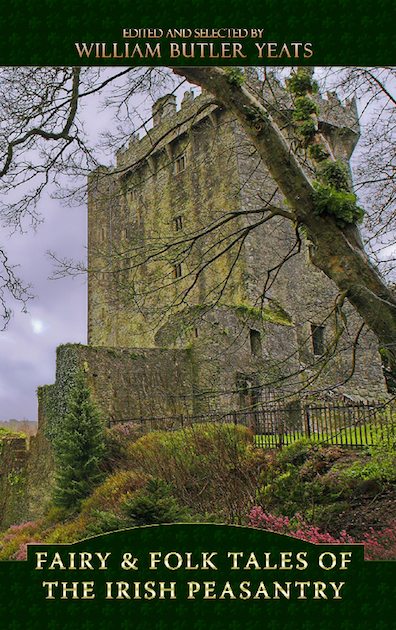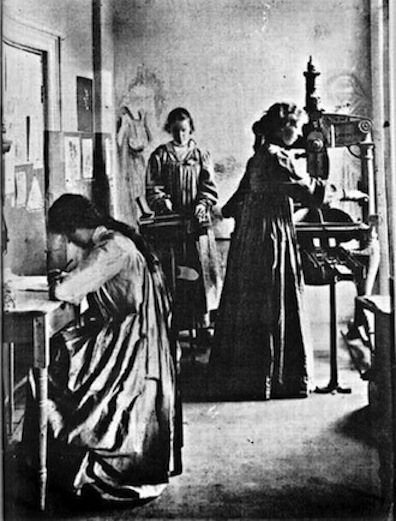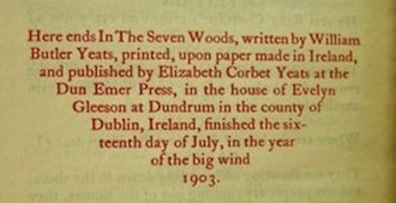Having already mocked the Irish Literary Revival on the tower's
parapet ("A new art colour for our Irish poets: snotgreen. You
can almost taste it, can't you?"), Mulligan again swivels his
wit that way as he serves breakfast in the room below:
"— That's folk, he said very earnestly, for your book,
Haines. Five lines of text and ten pages of notes about the
folk and the fishgods of Dundrum. Printed by the weird sisters
in the year of the big wind." His target here is the
cultivation of Irish “folk” identity: ancient legends, myths,
customs, and spiritual beliefs that were being studied and
imitated by scholars and writers from the 1880s onward. His
sarcasm is directed particularly at the greatest of the
Revival writers, William Butler Yeats, from whose Fergus
song he has just been quoting.
Thornton notes that "five lines of text and ten pages
of notes" seems to refer to "the work of the
antiquarians who were editing, explaining, and annotating
early Irish literature and folklore at this time." Gifford
says of the project, “At times this interest ran to
hairsplitting scholarship and at times to gross
sentimentality.” For Haines's benefit, Mulligan adopts the
persona of a hairsplitting pedant, and proceeds to demean the
seriousness of the scholarly enterprise by citing all sorts of
inauthentic arcane beliefs. A central figure in his mockery is
Yeats, who joined the ranks of the scholars when he edited a
collection titled Fairy and Folk Tales of the Irish
Peasantry in 1888. Yeats' poems in the 1880s and 1890s
show how extensively and beautifully these myths could shape a
vision of Irish life, and at the same time how readily they
could encourage escapism, freefloating sentiment, and vague
substitutes for thought.
“The fishgods of Dundrum” ridicules Yeats'
obsession. Gifford notes that fish gods “are associated with
the Formorians, gloomy giants of the sea, one of the legendary
peoples of prehistoric Ireland.” But Dundrum makes no sense in
connection with the Fomorians. One Dundrum, north of Dublin,
was the place “where ancient Irish tribes held a folk version
of Olympic games.” Another, south of Dublin, was the site of
an insane asylum and of a village where Yeats’ sister
Elizabeth established the Dun Emer press in 1903 to publish
his “new works and works by other living Irish authors in
limited editions on handmade paper.” Her sister Lily became
involved with the Dun Emer Guild, “which produced handwoven
embroideries and tapestries.” Readers can now discern the
context for Mulligan's earlier reference to "A new art
colour" for the covers of poetry books.
So a piece of authentic mythology (fishgods) is mixed up with
some unrelated ancient customs, and both are attached to the
Yeats family enterprise of reviving Irish art, with the
implication that all these cultural enterprises, and all three
Yeats siblings, belong in a lunatic asylum. At the end of
Oxen of the Sun, Mulligan can be heard continuing to
mock the Yeats sisters' publishing enterprise, now calling it
the "Druiddrum press." The "Ayes
have it," he proclaims: the bawdy ditty he is
chanting, or possibly Stephen's parody of the Sermon on the
Mount, is "To be printed and bound at the
Druiddrum press by two designing females. Calf covers of
pissedon green. Last word in art shades. Most
beautiful book come out of Ireland my time." The last sentence
repeats a
different attack on Yeats that Mulligan has made in Scylla
and Charybdis, mocking his praise of Lady Gregory,
another prominent writer of the Literary Revival.
“Printed by the weird sisters in the year of the big
wind” establishes another chain of bizarre and
wildly funny associations. The “weird sisters” have
nothing to do with Irish mythology. They appear in
Shakespeare’s Macbeth as Scottish witches whose name
may owe something to the Old English concept of wyrd,
fate. But after the glancing allusion to two sisters involved
in the publishing business it seems that Yeats’s sisters are a
bit weird. And indeed these sisters have used the phrase "the
big wind." The Dun Emer edition of Yeats’s In
the Seven Woods announces that the book was completed
“the sixteenth day of July in the year of the big wind, 1903.”
This phrase usually refers to 1839, which saw a terrible
windstorm that destroyed hundreds of houses. There was another
formidable tempest in 1903, but there is nothing ancient or
mythological about it. In Aeolus it is referred to
as "that cyclone of last year," and Oxen of the
Sun mentions "the big wind of last February a
year that did havoc the land so pitifully."
In his final sally, Mulligan turns from slandering the Yeats
family and riffing on mythology to mocking scholarly pedantry.
Addressing Stephen as if he were a professorial colleague, and
imitating academic affectation “in a fine puzzled voice,
lifting his brows,” he asks for assistance with a
bibliographic citation: "is mother Grogan's tea and
water pot spoken of in the Mabinogion or is it in the
Upanishads?" The question is as absurd as Feste
asking “For what says Quinapalus?” in Shakespeare’s Twelfth
Night. Mother Grogan is a character in a silly
contemporary Irish song rather than a figure of ancient
folklore. The medieval Mabinogion contains many
ancient Celtic legends, but it is Welsh rather than Irish. And
the Upanishads are ancient Vedic texts of Hindu spirituality
and philosophy—of great interest to Theosophists, but
otherwise completely unconnected to Ireland. Stephen,
“gravely” participating in the scholarly charade, ends the
mockery with his own very funny reply to Mulligan’s
which-is-it question: "I doubt it."
Even here, though, there is a Yeats connection: in praising
Lady Gregory's Cuchulain of Muirthemne: The Story of the
Men of the Red Branch of Ulster (1902) as the best to
come out of Ireland in his time, Yeats compared
the book to the epic tales in the Mabinogion.
Some readers have also speculated about how the Anglo-Irish
Haines may be implicated in Mulligan's mockery. On
ulyssesseen.com, Andrew Levitas argues that in referring to
the Mabinogion and the Upanishads Mulligan intends "to
skewer Haines’ attitude toward Ireland and things Irish.
Haines is collecting 'exotic' Irish sayings and other folk
esoterica, in the same way Bartok, Dvorak and Smetana
collected ethnic folk tunes from the backwaters of the
Austro-Hungarian Empire, as modernity began to overtake these
regions." Since Wales is "another Celtic nation incorporated
into Great Britain," and India is "Britain’s leading colony,"
Mulligan may be mocking the Englishman's project of cultural
appropriation.


